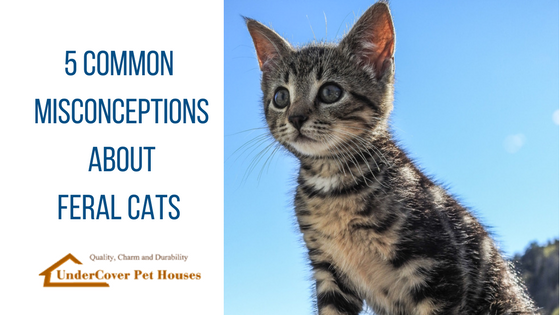 Loading... Please wait...
Loading... Please wait...5 Common Misconceptions About Feral Cats
Posted by Danny MacDonald on 2017 Nov 10th

When the conversation turns to feral cats, many people have strong opinions. “Feral cats are a nuisance. They are always begging for food. I’m scared they’ll bite my own cats,” people may say. Unfortunately, there are several common misconceptions about feral cats.
Here are 5 common misconceptions about feral cats.
1) Feral cats will attack humans and/or pets.
Fact: Feral cats are much more likely to flee than fight.
Unless they are cornered, they rarely display aggressive behaviour toward humans. “Like wildlife species, when raised without human contact, cats remain extremely wary of humans and flee if approached,” says the Cornell Vet College.
Feral cats are extremely nervous around humans. As long as people respect their space, feral cats will avoid human interaction.
2) Feral cats spread disease.
Fact: People rarely contract diseases from contact with cats, especially feral cats.
According to the USA Centers for Disease Control and Prevention, cats rarely transmit illness or infection to human caregivers.
“Feral cats pose even less risk to public health than pet cats because they have minimal human contact, and any contact that does occur is almost always initiated by the person,” says Deborah L. Ackerman, M.S., Ph.D., of the UCLA School of Public Health.
Cats, either domestic or feral, pose little risk of disease to their caregivers.
3) Feral cats are a different species than domestic cats.
Fact: Feral and domestic cats are actually the same species.
Although they both belong to the species Felis catus, the main difference between feral and domestic cats is their behaviour.
“Feral cats are 'wild' offspring of domestic cats and result from pet owners' abandoning and/or failing to neuter their pets. They generally do not allow handling by humans and must be trapped in order to be presented to a veterinarian for care,” says the Cornell Vet College.
4) Feral cats can be adopted and live indoors.
Fact: In most cases, feral cats can’t make a successful transition to indoor life.
Sympathetic cat lovers may want to adopt a feral cat. However, most feral cats are too afraid of humans to take the leap into living indoors.
Instead of bringing them into your home, you can provide an outdoor cat house. When the colder weather comes, they will be warm in their heated cat house for winter.
The exception to this rule is feral kittens. If a feral kitten is adopted at 4-6 weeks old, it may be successfully socialized. With time, lots of attention, and patience, most feral kittens can be tamed.
5) Feral cats will beg for food.
Fact: Because of their fear of humans, feral cats are skilled scavengers.
If a cat shows up at your door meowing for a little snack, he is probably a stray or a pet cat. In reality, feral cats are highly self-sufficient.
According to Alley Cat Allies, "Feral cats are opportunistic feeders—they will eat whatever food is easiest to find. For many feral cats, people’s garbage is a main source of food.” They will also hunt for rodents or small birds.
If you want to help feed your neighbourhood’s feral cats, you can provide food in an outdoor feeding station. That way, they will have a reliable food source when the colder weather hits.
Maybe you’ve heard some of these common misconceptions about feral cats.
Although they are often misunderstood and even feared, many people enjoy helping outdoor cats. These people have discovered that, beyond the stereotypes, feral cats are sensitive, lovable creatures who just need a helping hand.
Looking for a heated cat house for winter? Check out our handcrafted houses at www.undercoverpethouses.com today!
